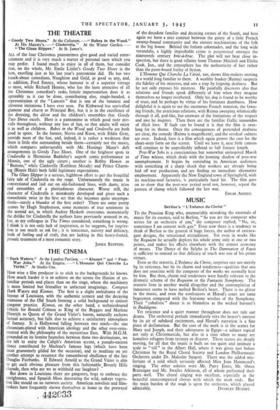THE CINEMA
" Dark Waters." At the London Pavilion.—" Kismet " and " Post- War Jobs." At the Empire. " L'Homme Qui Cherche La Write." At Studio One.
How wise a film producer is to stick to the backgrounds he knows. How much harder it is to' achieve on the screen the illusion of un- familiar periods and places than on the stage, where the machinery is more limited but friendlier to unfactual imaginings. Compare Dark Waters and Kismet. The first is a slight melodrama of the bayous of Louisiana, with the authentic scenery and the decaying mansions of the Old South forming a solid background to sinister gangster practice. Kismet, on the other hand, a technicoloured vehicle for Ronald Colman as King of the Beggars and Marlene Dietrich as Queen of the Grand Vizier's harem, naturally eschews factual accuracy, but fails also to achieve a satisfactory atmosphere of fantasy. It is Hollywood falling between two stools—the one chromium-plated with American ideology and the other over-orna- mented with the philosophy of the mysterious East. With M.G.M. grounded on its leonine haunches between these two destinations, we are left to enjoy the Caliph's American accent, a pseudo-eastern dance contributed by Marlene's famous legs (which have been most gruesomely gilded for the occasion), and to meditate on yet another attempt to resurrect the remembered ebullience of the late Douglas Fairbanks. If Edward Arnold as the Grand Vizier is able to get such obvious pleasure from this fashionable Beverly Hills charade, then who are we to withhold our laughter?
But down in Louisiana there are gangsters, bogs to embrace the unrighteous, and Spanish Moss decorating the wild, unkept vegeta- tion like mould on an outworn society. American novelists and film- makers have frequently shown themselves at home in the portrayal
of the decadent families and decaying estates of the South, and here again we have a nice contrast between the gaiety of a little French swamp-bound community and the sinister machinations of the folk at the big house. Behind the forlorn colonnades, and the long wide verandahs, a highly improbable crime is perpetrated amongst the nineteenth century bric-a-brac. The plot will not bear close in- spection, but there is good villainy from Thomas Mitchell and Elisha Cook, Jun., and the atmosphere has the authenticity of fact rather than the paste-board frailty of fiction.
L'Homme Qui Cherche La Write, too, shows film-makers moving in a world long familiar to them. A wealthy banker (Raimu) suspects the fidelity of his mistress, and sets a trap by feigning deafness. But he not only exposes his mistress. He painfully discovers also that relations and friends speak differently of him when they imagine themselves no longer overheard. Only his dog is found to be worthy of trust, and he perhaps by virtue of his fortunate dumbness. How delightful it is again to see the enormous French mansion, the fawn- ing friends, the avaricious relations, with Raimu sweeping whimsically through it all, god-like, but unaware of the limitations of the respect and awe he inspires. Then there are the familiar Gallic innuendos of illicit love. If fault can be found it is that the film is over- long for its theme. Once the consequences of pretended deafness are clear, the comedy (Raimu is magnificent), and the residual sadness are over. Indeed, here is a film which again proves the case for the short-story form on the screen. Until we have it, neat little cameos will continue to be unprofitably inflated to full feature length.
Post-War Jobs is a conscientious but somewhat uninspired March of Time melease, which deals with the looming shadow of post-war unemployment. It begins by reminding its American audiences with something of a sharp • shock that workers are already being laid off war production, and are finding no immediate alternative employment. Apparently the New England town of Springfie!d, with its machine-tool factories, is particularly hard hit. The film goes on to show that the post-war period need not, however, repeat the pattern of slump which followed the last war.
EDGAR ANSTEY.


























 Previous page
Previous page